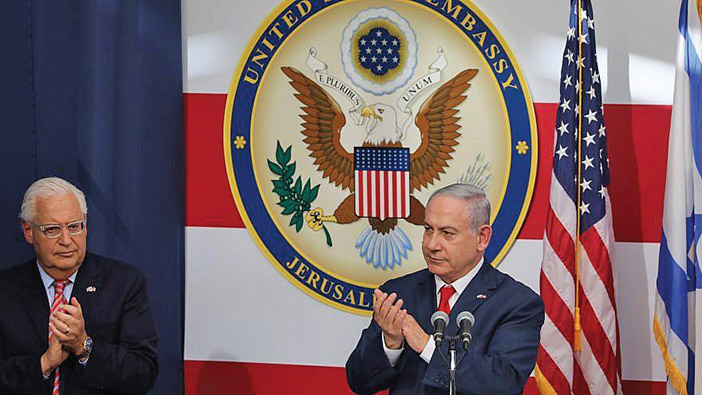
“Today, we follow through on this recognition and open our embassy in the historic and sacred land of Jerusalem,” U.S. President Donald Trump said in a video greeting.
The United States officially opening its new embassy in Jerusalem on Monday fulfills a key promise made by its president, Donald Trump.
Trump, who did not attend the ceremony, issued a video greeting to the attendees. “Today, Jerusalem is the seat of Israel’s government; it is the home of the Israeli legislature and the Israeli Supreme Court, and Israel’s prime minister and president,” he said.
“Israel is a sovereign nation, with the right like every other sovereign nation to determine its own capital. Yet for many years we failed to acknowledge the obvious. The plain reality is that Israel’s capital is Jerusalem. Today we follow through on this recognition and open our embassy in the historic and sacred land of Jerusalem,” he added, noting that it was opening “many, many years ahead of schedule.”
The embassy ceremony, which was attended by some 800 American and Israeli officials, was held in Jerusalem’s Arnona neighborhood, the site of the new embassy.
Its opening capped a move first set forth by Congress in 1995 as part of the Jerusalem Embassy Act, which recognized Jerusalem as the capital of Israel and called for the relocation of the embassy from Tel Aviv to Jerusalem. However, successive American presidents, citing national security issues, have issued six-month waivers on the move until Trump announced his decision in December 2017 to go forward with it.
The United States has long had a consulate in Jerusalem, which mainly dealt with the Palestinian Authority. The new Jerusalem embassy will see the ambassador’s office and about 50 staff members relocate to an already existing former U.S. consulate in Jerusalem, while the United States plans for eventually building an entirely new embassy building in the city.
The Trump administration was well-represented at the embassy dedication, with Deputy Secretary of State John J. Sullivan, Secretary of the Treasury Steven Mnuchin, Trump’s son-in-law and senior adviser Jared Kushner, Trump’s daughter and adviser Ivanka Trump, and Special Representative for International Negotiations Jason Greenblatt all attending. Additionally, U.S. Ambassador to Israel David Friedman presided over the embassy ceremony.
In his address, Kushner said that when Trump makes a promise, he “keeps it.”
“While presidents before him have backed down from their pledge to move the American Embassy once they were in office, this president delivered. Because when President Trump makes a promise, he keeps it,” said Kushner.
Israeli Prime Minister Benjamin Netanyahu also thanked the U.S. leader for “having the courage” to move the embassy.
“What a glorious day for Israel,” he said. “Remember this moment. This is history. President Trump, by recognizing history you have made history. All of us are deeply moved, all of us are deeply grateful.”
“This is a great day,” continued the prime minister. “A great day for Jerusalem. A great day for the State of Israel. A day that will be engraved in our national memory for generations.”
The Israeli leader also thanked Kushner and Greenblatt for their “tireless efforts to advance peace.”
Netanyahu stated that “the truth and peace are interconnected. A peace that is built on lies will crash on the rocks of Middle Eastern realities. You can only build peace on truth. And the truth is that Jerusalem has been and will always be the capital of the Jewish people, the capital of the Jewish state.”
The opening of the embassy on Monday also came amid clashes between Israeli security forces and Palestinians along the border with Gaza. At least 52 Palestinians had been killed in the violence as nearly 40,000 Palestinians, encouraged by the terror group Hamas, gathered along the security fence where they burned tires, threw stones and attempted to infiltrate Israel.
Kushner addressed the clashes along the border in his speech, saying: “As we have seen from the protests of the last month and even today, those provoking violence are part of the problem and not part of the solution.”
By JNS.org










